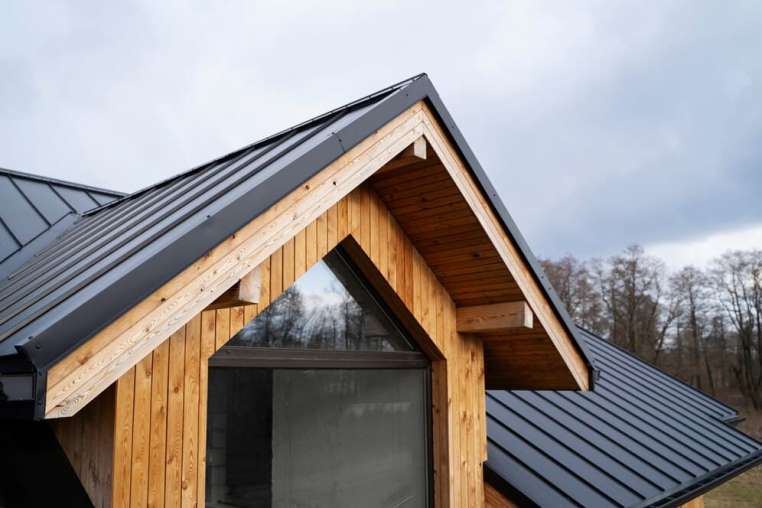Metal roofs can be prone to creating noise, especially during heavy rain or hailstorms, causing disturbance and discomfort. Fortunately, there are effective solutions available to address this issue and ensure a quieter living or working environment. By taking proactive measures and implementing soundproofing techniques, you can enjoy the durability and longevity of a metal roof without the unwanted noise disruptions.
Now let’s explore some doable methods for reducing noise pollution caused by metal roofs and fostering a calm interior environment.
Causes Of Metal Roof Noise
Metal roofs are known for their longevity and durability, but they can sometimes create noise that disrupts peaceful living environments. Understanding the causes of metal roof noise is essential in finding solutions to prevent and resolve this issue.
Material Properties
The inherent characteristics of metal, such as its density and rigidity, contribute to the noise it produces. When rain, hail, or even debris come into contact with the metal surface, the vibrations created resonate throughout the roof, amplifying the sound.
Expansion And Contraction
Metal roofs expand and contract due to temperature changes, which can lead to noise. The heat from the sun causes the metal to expand, while cooler temperatures cause it to contract.
This continuous cycle of expansion and contraction can result in creaking, popping, or snapping sounds. Additionally, metal components rubbing against each other due to movement can also create unwanted noise.
Read Also: Sheet metal roofs – advantages, disadvantages and placement
Loose Fasteners
Inadequately secured fasteners can be another source of metal roof noise. Fasteners, such as screws or nails, hold the metal panels in place.
If these fasteners become loose over time, they can cause the panels to vibrate or rattle, leading to noise issues. This problem is more common in older roofs or those with poor maintenance.
Poor Installation
The way a metal roof is installed plays a significant role in noise prevention. Poor installation techniques or insufficient insulation can result in metal-on-metal contact, leading to loud noises during expansion and contraction.
Additionally, improper sealing or gaps between panels can allow air to pass through, contributing to whistling or howling sounds during windy conditions.
Environmental Factors
External factors such as wind speed and direction, as well as the size and shape of raindrops or hailstones, can influence the amount of noise generated by a metal roof. In areas prone to high winds or frequent storms, homeowners may experience more significant noise disturbances.
Methods To Reduce Metal Roof Noise
Metal roofs are known for their durability and longevity, but they can sometimes produce noticeable noise during rainfall or hailstorms. However, with a few simple methods, you can effectively minimize the noise from your metal roof, providing a more peaceful and quiet living environment.
Install Soundproofing Materials
One of the most effective solutions for reducing metal roof noise is to install soundproofing materials. These can include foam or fiberglass insulation, acoustic panels, or sound-deadening mats. These materials absorb sound vibrations, preventing them from reverberating throughout the home.
Insulation
Applying proper insulation to your metal roof can significantly reduce the noise levels. Installing a high-quality insulation material between the metal panels and the roof structure will help absorb the sound waves and dampen the noise.
This layer of insulation serves as a barrier, preventing the transmission of noise into your living space.
Add Noise-Blocking Drywall Ceilings
Another effective option for reducing metal roof noise is to add noise-blocking drywall ceilings. These specialized drywall panels are designed to absorb and dampen sound vibrations, minimizing the transmission of noise into the home.
By installing noise-blocking drywall ceilings beneath the metal roof, homeowners can enjoy a quieter indoor environment and enhanced comfort.
Adding An Underlayment
Incorporating an underlayment beneath the metal roofing panels can also diminish the noise. A thick and sound-absorbing underlayment, such as felt or foam, provides an additional barrier against impact noise from rain or other external sources.
It acts as a cushion between the metal roof and the roof deck, further reducing the transmission of sound.
Tightening Fasteners
Regularly inspecting and tightening fasteners on your metal roof is crucial in minimizing noise. Loose fasteners can cause the roof panels to rattle or vibrate during adverse weather conditions, resulting in increased noise levels.
Ensuring that all fasteners are securely tightened will help stabilize the roof structure and reduce the potential for noise generation.
Consider Sound-reducing Coatings
Metal roofs can generate noise, but using sound-reducing coatings can help minimize the noise level significantly. Choosing thicker metal for your roof can dampen noise and provide better insulation against sound disturbances.
Consider alternative materials like tiles or asphalt shingles as they offer sound dampening properties compared to metal roofs.
Maintenance Tips To Minimize Metal Roof Noise
Keeping your metal roof in top condition is key to preventing unwanted noises. By following these maintenance tips, you can minimize noise disruptions and enjoy a quieter living space.
Inspect And Replace Damaged Panels
- Regularly check for any damage to your metal roof panels.
- Replace damaged panels promptly to prevent noise issues.
Clear Debris Regularly
- Remove debris such as leaves, branches, and dirt from your roof regularly.
- Debris accumulation can lead to noise disturbances on your metal roof.
Address Any Structural Issues
- Address any structural issues that may be causing noise on your metal roof.
- Properly maintain and reinforce the roof structure as needed.
Conclusion
Reducing metal roof noise is achievable and can considerably improve your living space. Implementing the appropriate insulation and installing a ventilation system are effective strategies for minimizing noise.
Regular maintenance and quick repairs can further prevent any noise disturbances. By addressing these solutions, you can enjoy a quieter and more peaceful environment under your metal roof.
